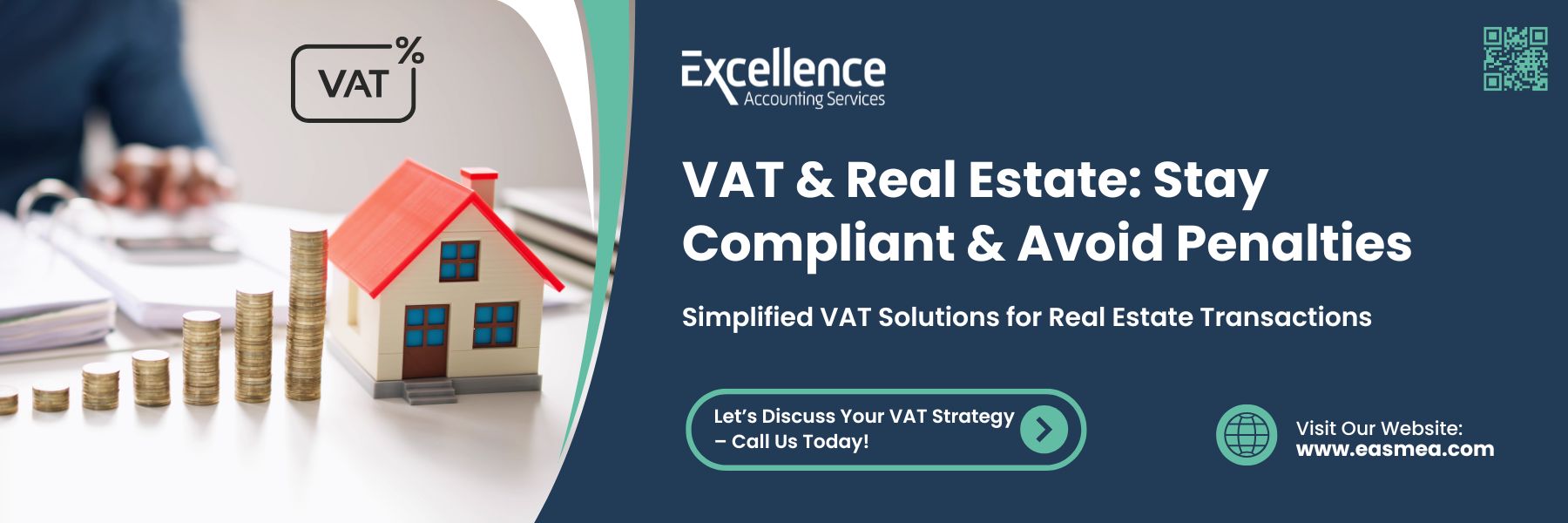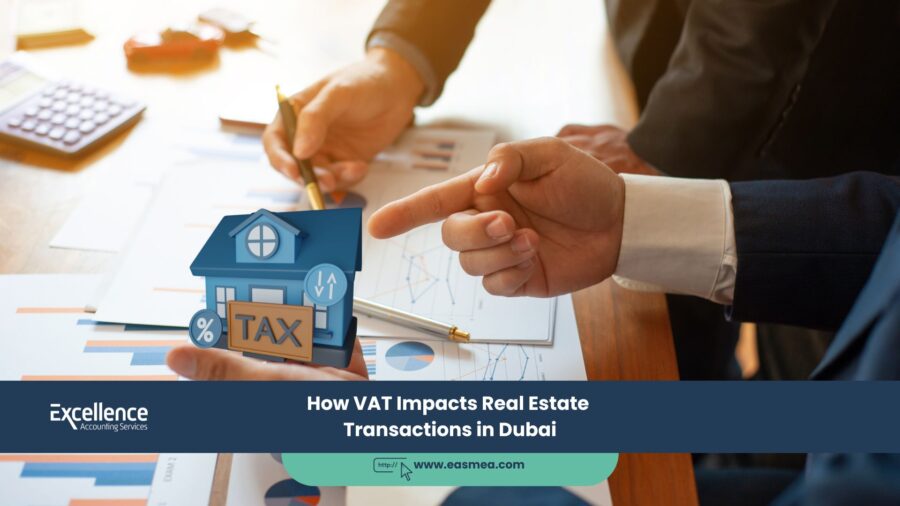Introduction:VAT Impacts Real Estate Transactions in Dubai
The introduction of Value Added Tax (VAT) in the United Arab Emirates has significantly reshaped the landscape of real estate transactions in Dubai. As we navigate through 2025, understanding the nuances of VAT and its impact on property dealings has become more crucial than ever for investors, developers, and homebuyers alike.
- Introduction:VAT Impacts Real Estate Transactions in Dubai
- Understanding VAT in Dubai's Real Estate Sector
- Impact of VAT on Residential Real Estate in Dubai
- VAT Implications for Commercial Real Estate in Dubai
- VAT Registration for Real Estate Businesses in Dubai
- Strategies for Managing VAT in Real Estate Transactions
- Future Trends in Dubai Real Estate VAT
- What Excellence Accounting Services Can Offer
- Frequently Asked Questions
- Conclusion
- Don't Let VAT Complexities Hold You Back
Dubai’s real estate market, known for its luxury properties and innovative developments, has had to adapt to the VAT regime since its implementation. This tax system has introduced new considerations for those involved in property transactions, from residential purchases to commercial leases.
In this comprehensive guide, we’ll delve deep into how VAT affects various aspects of real estate in Dubai. We’ll explore the different tax rates applied to residential and commercial properties, examine exemptions, and discuss strategies for navigating this complex tax landscape.
Whether you’re a first-time buyer, a seasoned investor, or a real estate professional, this article will provide you with valuable insights into the VAT implications on Dubai’s property market in 2025.
Let’s embark on this journey to demystify VAT in Dubai’s real estate sector.
Key Takeaways
- VAT in Dubai real estate is set at 5% for most commercial property transactions.
- Residential properties and bare land are generally exempt from VAT.
- The introduction of VAT has led to increased interest in off-plan properties and longer-term rental agreements.
- Commercial property buyers must pay VAT, while landlords are exempt from paying VAT on rental income.
- Understanding VAT regulations is crucial for making informed decisions in Dubai’s property market.

Understanding VAT in Dubai’s Real Estate Sector
Overview of VAT Implementation in UAE
The United Arab Emirates introduced Value Added Tax (VAT) on January 1, 2018, as part of a broader economic strategy to diversify revenue sources. This 5% tax applies to most goods and services, including certain real estate transactions.
The Federal Tax Authority (FTA) oversees the implementation and management of VAT in the UAE, ensuring compliance across various sectors, including real estate.
VAT Rates for Different Property Types
In Dubai’s real estate market, VAT application varies depending on the property type and its intended use. Here’s a breakdown of how VAT is applied:
| Property Type | VAT Rate | Notes |
|---|---|---|
| Commercial Properties | 5% | Applies to sales and leases |
| Residential Properties | Exempt | First sale/lease exempt |
| Bare Land | Exempt | Depends on intended use |
“Understanding the VAT implications for different property types is crucial for both buyers and sellers in Dubai’s real estate market.” – Federal Tax Authority
Key Points:
- Commercial properties are subject to the standard 5% VAT rate.
- Residential properties are generally VAT-exempt.
- The first sale of a new residential property is zero-rated.
- Subsequent sales of residential properties are exempt from VAT.
Impact of VAT on Residential Real Estate in Dubai
VAT Exemptions for Residential Properties
Residential properties in Dubai enjoy a special status when it comes to VAT. The UAE government has implemented measures to ensure that VAT does not overly burden the residential real estate sector. Here are the key exemptions:
- First sale of new residential properties is zero-rated
- Subsequent sales of residential properties are exempt from VAT
- Long-term residential leases (more than 6 months) are exempt from VAT
- Short-term residential leases (less than 6 months) are subject to 5% VAT
Effects on Residential Property Market
The introduction of VAT has had several notable effects on Dubai’s residential property market:
Increased Interest in Off-Plan Properties:
- Buyers are showing more interest in off-plan properties to potentially save on future VAT costs.
- Developers are adjusting their marketing strategies to highlight VAT benefits of off-plan purchases.
Shift Towards Longer-Term Rentals:
- There’s a trend towards longer-term rental agreements to take advantage of VAT exemptions.
- Landlords and tenants are renegotiating terms to align with VAT-efficient structures.
The VAT exemptions for residential properties have helped maintain the attractiveness of Dubai’s housing market for both local and international buyers.
VAT Implications for Commercial Real Estate in Dubai
Standard VAT Rate for Commercial Properties
Commercial properties in Dubai are subject to the standard VAT rate of 5%. This applies to various transactions and services related to commercial real estate.
Here’s what you need to know:
- Sale of commercial properties incurs 5% VAT
- Leasing of commercial spaces is subject to 5% VAT
- Services related to commercial properties (e.g., maintenance, management) are VAT-taxable
Impact on Commercial Property Transactions
The implementation of VAT has significantly influenced commercial real estate dealings in Dubai:
Effects on Pricing and Negotiations:
- Buyers and tenants now factor in the additional 5% VAT when budgeting for commercial properties.
- Negotiations often include discussions on who bears the VAT burden.
Changes in Investment Strategies:
- Investors are reassessing their commercial real estate portfolios to optimize VAT efficiency.
- Some investors are shifting focus to residential properties due to VAT exemptions.
| Aspect | Pre-VAT | Post-VAT |
|---|---|---|
| Property Valuation | Based on market value | Includes VAT considerations |
| Transaction Costs | Lower overall costs | 5% VAT added to costs |
| Investment Returns | Higher potential returns | Slightly reduced due to VAT |
VAT Registration for Real Estate Businesses in Dubai
Who Needs to Register for VAT?
Understanding VAT registration requirements is crucial for real estate businesses operating in Dubai. The Federal Tax Authority (FTA) has set clear guidelines on who needs to register:
- Businesses with taxable supplies and imports exceeding AED 375,000 annually must register for VAT.
- Companies can voluntarily register if their supplies and imports exceed AED 187,500.
- Real estate developers, agents, and property management companies typically need to register.
Process and Requirements for VAT Registration
The VAT registration process in Dubai involves several steps:
Steps for VAT Registration:
- Gather necessary documents (trade license, financial statements, etc.)
- Apply online through the FTA portal
- Provide additional information if requested by FTA
- Receive VAT registration certificate
Key Requirements:
- Valid trade license
- Financial records showing turnover
- Bank account details
- Authorized signatory information
Timely VAT registration is essential for real estate businesses to ensure compliance and avoid penalties.
Strategies for Managing VAT in Real Estate Transactions
VAT Planning for Developers and Investors
Effective VAT planning can significantly impact the profitability of real estate projects in Dubai.
Here are some strategies to consider:
- Timing of Transactions: Plan property completions and transfers to optimize VAT implications.
- Structuring Deals: Consider VAT-efficient structures for large-scale developments.
- Cash Flow Management: Factor in VAT payments and refunds in financial planning.
- Off-Plan Sales Strategy: Leverage VAT benefits of off-plan sales for residential properties.
VAT Recovery and Compliance
Ensuring proper VAT recovery and compliance is crucial for real estate businesses:
VAT Recovery Tips:
- Keep detailed records of all VAT-related transactions
- Understanding which expenses qualify for VAT recovery
- Regularly review VAT return filings for accuracy
Compliance Best Practices:
- Implement robust accounting systems for VAT tracking
- Stay updated on FTA regulations and guidelines
- Conduct periodic internal VAT audits
| Aspect | Best Practice | Benefit |
|---|---|---|
| Record Keeping | Digital documentation | Easier audits and compliance |
| VAT Returns | Timely and accurate filing | Avoid penalties and smooth operations |
| Staff Training | Regular VAT workshops | Improved compliance across organization |
Future Trends in Dubai Real Estate VAT
Potential Changes in VAT Regulations
As Dubai’s real estate market evolves, VAT regulations may adapt to new realities:
- Possible adjustments to VAT rates for specific property types
- Potential introduction of new exemptions or zero-rated categories
- Enhanced digital reporting requirements for VAT in real estate transactions
Market Adaptations to VAT
The Dubai real estate market continues to adapt to the VAT regime:
Emerging Trends:
- Increased focus on VAT-efficient property management
- Growing demand for VAT advisory services in real estate
- Integration of VAT considerations in property valuation models
“The future of Dubai’s real estate market will likely see further integration of VAT considerations in all aspects of property transactions and management.”
What Excellence Accounting Services Can Offer
At Excellence Accounting Services, we understand the complexities of VAT in Dubai’s real estate sector. Our team of expert accountants and tax advisors offers comprehensive services to help you navigate the VAT landscape:
- VAT Registration Assistance: We guide you through the entire VAT registration process, ensuring compliance with FTA requirements.
- VAT Planning for Real Estate: Our specialists develop tailored VAT strategies for your real estate projects, maximizing efficiency and minimizing tax liabilities.
- Compliance and Reporting: We handle all aspects of VAT compliance, including timely filing of returns and maintaining accurate records.
- VAT Audits and Health Checks: Our team conducts thorough VAT audits to identify potential issues and ensure ongoing compliance.
Advisory Services: We provide expert advice on complex VAT matters related to real estate transactions and investments.
With Excellence Accounting Services, you can focus on your core business while we ensure your VAT affairs are in expert hands.
Frequently Asked Questions
VAT impact on residential property purchases in Dubai is minimal for end-users. The first sale of new residential properties is zero-rated, meaning no VAT is charged. Subsequent sales of residential properties are exempt from VAT. This policy aims to keep housing affordable and encourage home ownership.
However, buyers should be aware that certain services related to residential properties, such as maintenance or real estate agency fees, may be subject to the standard 5% VAT rate. It’s important to factor in these potential additional costs when budgeting for a residential property purchase in Dubai.
While commercial properties are generally subject to the standard 5% VAT rate, there are some specific exemptions and special cases to be aware of:
- The sale of vacant commercial land may be exempt from VAT, depending on its intended use.
- The lease of commercial property to a person not registered for VAT may be exempt.
- Certain zones designated as ‘Designated Zones’ by the UAE government may have special VAT treatment.
It’s crucial for buyers and sellers of commercial properties to consult with tax experts to understand the specific VAT implications of their transactions, as the rules can be complex and subject to interpretation by the Federal Tax Authority.
VAT treatment of off-plan property purchases in Dubai depends on the property type and its intended use:
- For residential off-plan properties, the first sale is typically zero-rated, meaning no VAT is charged.
- Commercial off-plan properties are subject to the standard 5% VAT rate.
The growing interest in off-plan properties, especially residential ones, is partly due to the potential VAT savings. Buyers should, however, be aware that while the property itself may be zero-rated or exempt, associated services (like booking fees or agency commissions) may still be subject to VAT.
Real estate developers in Dubai face several VAT considerations:
- They must register for VAT if their taxable supplies exceed the mandatory registration threshold.
- Developers can reclaim VAT on their inputs (construction costs, materials, etc.) for commercial projects.
- For residential developments, while the first sale is zero-rated, developers may still reclaim VAT on inputs.
- Careful record-keeping and accounting are crucial to managing VAT effectively.
Developers need to factor VAT into their pricing strategies and cash flow projections. They should also be prepared for regular VAT compliance activities, including filing returns and maintaining detailed records of all VAT-related transactions.
The VAT treatment of rental income in Dubai varies depending on the property type and lease duration:
- Long-term residential leases (more than 6 months) are exempt from VAT.
- Short-term residential leases (less than 6 months) are subject to 5% VAT.
- Commercial property leases are generally subject to 5% VAT.
Landlords need to be aware of these distinctions and adjust their rental strategies accordingly. For commercial properties, landlords should clearly communicate whether quoted rents are inclusive or exclusive of VAT. It’s also important for landlords to maintain accurate records of rental income and any VAT collected or paid.
Property management services in Dubai are generally subject to the standard 5% VAT rate.
This includes services such as:
- Maintenance and repair
- Security services
- Cleaning services
- Facility management
Property owners and management companies need to factor this VAT into their service agreements and pricing structures. For residential properties, while the lease itself may be VAT-exempt, these associated services will still incur VAT.
It’s important for property management companies to register for VAT if their taxable supplies exceed the threshold, and to maintain detailed records of all VAT-able services provided.
Real Estate Investment Trusts (REITs) in Dubai face unique VAT considerations:
- The sale or purchase of REIT units is generally exempt from VAT.
- However, the underlying property transactions conducted by the REIT may be subject to VAT.
- REITs must carefully manage their VAT obligations on rental income and property management services.
Investors in REITs should be aware that while their investment transactions may be VAT-exempt, the REIT’s performance could be indirectly affected by VAT on its property transactions and services. REITs need to implement robust VAT management strategies to optimize their tax efficiency and maintain their attractiveness to investors.
The Federal Tax Authority (FTA) in the UAE has set strict penalties for non-compliance with VAT regulations, which apply to the real estate sector:
- Failure to register for VAT: AED 20,000.
- Late registration: AED 10,000.
- Late filing of VAT returns: AED 1,000 for the first offense, AED 2,000 for subsequent offenses.
- Late payment of VAT: 2% of the unpaid tax due immediately, 4% on the seventh day, and 1% daily up to 300%.
These penalties underscore the importance of timely registration, accurate reporting, and prompt payment of VAT obligations for all entities involved in real estate transactions in Dubai.
Real estate investors in Dubai can optimize their VAT position through several strategies:
- Carefully structure investments to maximize VAT efficiency (e.g., focusing on residential properties for long-term leases).
- Time property acquisitions and disposals strategically to manage VAT cash flow.
- Maintain detailed records to ensure all eligible VAT can be reclaimed.
- Consider the VAT implications when deciding between direct property ownership and investment through REITs.
- Stay informed about any changes in VAT regulations that could affect real estate investments.
Investors should also consider seeking professional advice to develop a comprehensive VAT strategy tailored to their specific investment portfolio and objectives.
Proper documentation is crucial for VAT compliance in Dubai’s real estate sector. Key documents include:
- Sales and purchase agreements clearly stating VAT treatment.
- Tax invoices for all VAT-able transactions.
- Lease agreements detailing VAT implications.
- Property valuation reports.
- VAT registration certificates
- Records of input VAT paid on expenses related to the property
- VAT returns and payment receipts
Maintaining comprehensive and accurate documentation not only ensures compliance but also facilitates smooth audits and helps in resolving any disputes with the tax authorities. Real estate businesses should implement robust record-keeping systems to manage these documents effectively.
Conclusion
As we’ve explored throughout this comprehensive guide, VAT has become an integral part of Dubai’s real estate landscape in 2025. Its impact extends across various aspects of property transactions, from residential purchases to commercial leases, and affects all stakeholders in the market.
Key points to remember include:
- The differentiation between residential and commercial properties in VAT treatment
- The importance of VAT registration for real estate businesses
- The need for strategic VAT planning in property development and investment
- The ongoing adaptations of the market to VAT regulations
Understanding and navigating the VAT system is crucial for success in Dubai’s dynamic real estate sector. Whether you’re a developer, investor, or homebuyer, staying informed about VAT implications can significantly impact your financial decisions and outcomes.
As the real estate market continues to evolve, so too will the VAT landscape. Staying abreast of regulatory changes and market trends will be essential for anyone involved in Dubai’s property sector.




